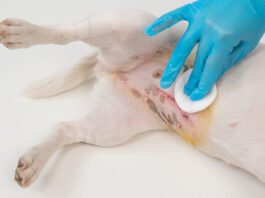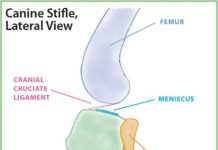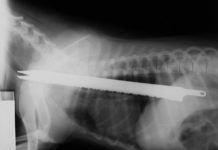Double TPLO Surgery for Dogs
As we learned in our independent research and from meeting with multiple veterinary surgeons, the TPLO surgery has become the gold-standard treatment for this kind of knee injury, especially in very large, strong, young, athletic dogs. While waiting for Sirius growth plates to close, we saw firsthand how conservative management worked - and then didnt. We were looking for a treatment option that gave Sirius the best chance at the kind of fun and normal life she deserved, one that would allow her to return to the activities and sports training that she loved.
Torn Cruciate Ligaments in Dogs
A cranial cruciate ligament injury in a young, healthy dog is typically an athletic injury. In older dogs, it is usually an injury of chronic wear and tear. This explains why its so common for a dog who has damaged the CrCL on one side to then tear it on the other side. When you take one back leg out of commission, the work load shifts to the other, increasing the strain on the ligaments of the good leg.
How to Prepare for An Emergency Animal Hospital Visit
If you have a dog, emergencies are inevitable. Dogs are prone to injuries, ingestion of toxic substances, and illnesses. Are you prepared in an emergency? Do you know what to do and what not to do? After nine years as an emergency veterinarian, I've seen it all! Here are my top tips for helping your emergency-room veterinarian help your dog.
12 Tips to Avoiding Trips to the Emergency Vet
Every year, thousands of dogs are treated in emergency veterinary hospitals across the country. I know; I spent nearly a decade as an emergency-room veterinarian. I always found it interesting that many of the most common injuries and illnesses I saw in emergency practice were also some of the easiest to prevent! Many of these problems can be avoided with a little common sense and preventative medicine.
Get Your Dog to Rest After Surgery
Stay, and "Leave It." One can also work on increasing the duration of these behaviors at this time.üToss your dog's kibble onto a "snuffle mat" to increase the amount of time it takes him to sniff out and consume each nugget. These washable mats are easy to make or can be store-bought.üDr. Jessica Hekman uses trick training and scent-work exercises (seen here) to keep her usually busy English Shepherd
2017 Best Dog Cone Alternatives
The term recovery collar is becoming the standard term to refer to what has been called an Elizabethan collar, a pet cone, or more humorously, a lampshade, a pet radar dish, and, of course, the misnomer cone of shame. There is no shame in needing help! The term Elizabethan collar is still heard frequently, but because it tends to be shortened to e-collar and because thats also a shortened version of electronic collar, the phrase is falling out of use for this application.
Give Your Dog a Smooth Recovery
Dogs are lousy patients. It's as simple as that. True, they don't constantly call for a glass of water or a plump of their pillow, but that's precisely the problem: Often unable to communicate distress, and possessing a stoicism that masks their true level of discomfort, dogs can mislead their owners into thinking that all's well after a surgical procedure, when in fact it's anything but.
Preparing Your Dog for a Successful Surgery
The word surgery
What You Should Know About Anesthesia Before You Schedule Your Dog’s Veterinary Procedure
Even the biggest worrywart owner usually relaxes a bit when her dog goes to sleep but of course, her anxiety will ratchet up to stratospheric levels if that sleep" is the span of temporary unconsciousness known as anesthesia. The more you know about it
True Veterinary Emergencies
Dogs can be real stoics, and it can be hard to tell if they are in pain or feeling poorly. Your best bet is to pay close attention to your dog when she is healthy note subtle things, like how she holds her body, the quality of her coat, the vibrancy in her eyes so you can notice when she's not feeling her best.
Should You Race to Take Your Dog to the Emergency Vet Clinic?
the odds are good that your dog's symptoms will resolve with time.
5 Things To Do If Your Dog Needs Cage Rest
Few things are worse than hearing the vet say those dreaded words: Cage Rest." Most often the consequence of an injury or major surgery

















